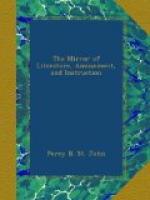“The whole arrangement was extremely comfortable, and highly inviting to repose, which the freshness of the apartment, rendered cool by a free circulation of air through its sides, enabled us to enjoy without any annoyance from heat or insects. One interruption only disturbed our first sleep—it was the pleasing melody of the evening hymn, which, after the lights were put out, was chanted by the whole family in the middle of the room. In the morning also we were awoke by their morning hymn, and family devotion.”
In speaking of the scenery of the island, Captain Beechey describes a singular spot set apart for himself by the ringleader of the mutiny.
“At the northern extremity of this ridge is a cave of some interest, as being the intended retreat of Christian, in the event of a landing being effected by any ship sent in pursuit of him, and where he resolved to sell his life as dearly as he could. In this recess he always kept a store of provisions, and near it erected a small hut, well concealed by trees, which served the purpose of a watch-house. So difficult was the approach to this cave, that even if the party were successful in crossing the ridge, as long as his ammunition lasted, he might have bid defiance to any force. An unfrequented and dangerous path leads from this place to a peak which commands a view of the western and southern coasts.”
In the account given by Adams, it is stated that Christian was uniformly cheerful; but, as he was a man of education, and by no means without feeling, we must suppose that this serene aspect was the result of effort; and we can readily conceive the bitterness with which, on retiring to this cave, like a hunted wild-beast, he gave way to the deep sense of shame and unavailing remorse which must at all times have weighed on his mind.
The Pitcairn islanders are no great musicians, and sing all their songs to one air. Captain Beechey, with a laudable desire to improve and enlarge their taste in this matter, begged one of his officers, who played on the violin, to favour the natives with a tune; but though it was well executed, the new melody appeared to be wasted on the audience. None of them, he says, appeared to have the least ear for music.
One of the officers took considerable pains to teach them the 100th psalm, that they might not chant all their psalms and hymns to the same air, but they did not evince the least aptitude or desire to learn it.
These interesting people appear to be strongly possessed with the binding nature of a promise, however remote the period in which it was made, or however indiscreet in itself. Of this we have the following rather pathetic example:—




